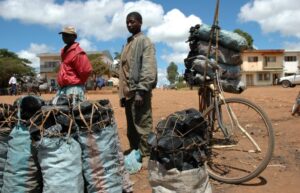 Since ancient times, charcoal has been used mainly to generate energy for cooking and heating purposes. Today, it also plays an important role in metallurgy and other heavy industries. Up to 17% of the wood used in the world is turned into charcoal. The booming charcoal trade is actually boosting the economies of many African countries. This fundamental approach to energy production has evolved from a simple cooking method into a cost-effective source of energy and empowerment. Over the past 20 years, charcoal production in African countries has skyrocketed and, by some estimates, has doubled. This has to do with decarbonization, i.e. removing fossil fuels and replacing them with a “greener” source of element C. Currently, the charcoal market in Europe is mainly supplied by imports from Africa. Many African producers have found business opportunities in the charcoal production sector. As other industries decline and lifestyles change due to urbanization, enterprising people across Africa are turning to charcoal to supplement or become their main source of income. However, they were unable to determine the damage this would cause to the continent. Compared to oil, cooking gas or electricity, charcoal is much easier to obtain, so those who depend on it for their daily cooking and energy needs can easily participate in the coal production process. With less than 10% of the rural population in sub-Saharan Africa having access to electricity, any source of energy is essential. About 80% of households on the African continent depend on charcoal as their main source of energy. The continent consumes more than 23 million tons per year.
Since ancient times, charcoal has been used mainly to generate energy for cooking and heating purposes. Today, it also plays an important role in metallurgy and other heavy industries. Up to 17% of the wood used in the world is turned into charcoal. The booming charcoal trade is actually boosting the economies of many African countries. This fundamental approach to energy production has evolved from a simple cooking method into a cost-effective source of energy and empowerment. Over the past 20 years, charcoal production in African countries has skyrocketed and, by some estimates, has doubled. This has to do with decarbonization, i.e. removing fossil fuels and replacing them with a “greener” source of element C. Currently, the charcoal market in Europe is mainly supplied by imports from Africa. Many African producers have found business opportunities in the charcoal production sector. As other industries decline and lifestyles change due to urbanization, enterprising people across Africa are turning to charcoal to supplement or become their main source of income. However, they were unable to determine the damage this would cause to the continent. Compared to oil, cooking gas or electricity, charcoal is much easier to obtain, so those who depend on it for their daily cooking and energy needs can easily participate in the coal production process. With less than 10% of the rural population in sub-Saharan Africa having access to electricity, any source of energy is essential. About 80% of households on the African continent depend on charcoal as their main source of energy. The continent consumes more than 23 million tons per year.
So, if charcoal production supports the development of African countries, where is the problem?
Charcoal has accelerated deforestation, exacerbated the deadly effects of climate change and killed people in their homes. The World Health Organization, WHO, says smoke from charcoal production and the burning of solid fuels such as wood, manure, charcoal and charcoal kills more than 10,000 people every day. This is more than AIDS, malaria and tuberculosis combined. Overall, deforestation is a big problem across Africa. Scientists warn that parts of South Africa could completely run out of firewood reserves by 2030. The situation in other African countries is no better. Charcoal is both a asset to African nations and a burden. First, the broader overall environmental impact of the charcoal boom needs to be considered. Deforestation is a major problem with a range of associated impacts that will increase the threat of climate change. Unfortunately, regulation of the coal industry in most African countries is at its best and non-existent in most places. Is Africa paying for the decarbonization of the Western world? Charcoal, and especially charcoal, as an BBQ fuel, requires meticulous quality control i.a. for the content of unacceptable impurities. The Institute has many years of experience in performing the tests necessary to determine the quality and purity of charcoal.
In this case, please contact Dr. Eng. Małgorzata Wojtaszek-Kalaitzidi – Deputy Head of the Laboratory of Coking Technologies (48 32 621 62 41; mwojtaszek@itpe.pl).